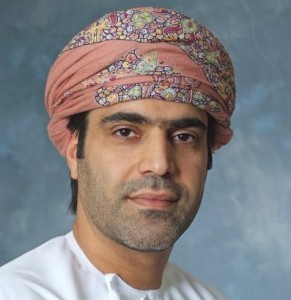Talal Sulaiman Al Rahbi
Dy CEO, IT Authority – Oman
Speaks to Teletimes International
Interview: Khalid Athar
 Talal Bin Sulaiman Al Rahbi is currently working as the Deputy CEO at Information Technology Authority (ITA) in the Sultanate of Oman. He is responsible for ITA Divisions that are implementing training programs and strategic awareness in support of the Digital Oman Strategy and eGovernment initiative, and directs programs and projects concerning development of the IT industry in the Sultanate. Also under Mr. Al Rahbi’s mandate is promoting the e.oman initiative locally and globally, supervising programs for international software licensing agreements.
Talal Bin Sulaiman Al Rahbi is currently working as the Deputy CEO at Information Technology Authority (ITA) in the Sultanate of Oman. He is responsible for ITA Divisions that are implementing training programs and strategic awareness in support of the Digital Oman Strategy and eGovernment initiative, and directs programs and projects concerning development of the IT industry in the Sultanate. Also under Mr. Al Rahbi’s mandate is promoting the e.oman initiative locally and globally, supervising programs for international software licensing agreements.
Among his responsibilities is managing research work related to surveys, statistics and indicators for ITA. Mr. Al Rahbi is also in charge of operations related to ITA contracts and investment. He is currently a member of the board for the UNESCO Institute for Statistics and is a member of the Technical Committee for Statistics in the Sultanate of Oman.
Prior to joining ITA, Talal worked with Omantel as the head of project development and market intelligence so he was working in the telecom sector. He also worked in United States for one year. Before that, he was in a council in the government, working on economic research.
Talal Al Rahbi attended university in the United States of America. He has a Master Degree in Public Policy and Administration from the University of Oregon, and a Bachelors Degree in Economics from the University of Louisiana.
Talal has an experience of over 10 years in leadership positions within different government and private sector organizations and a successful track record in setting up departments, recruiting talented teams, and establishing processes. He is a result oriented person with ability to lead teams to common objectives and high standards achievements. Talal has experience in leading technical projects that require different level of systems and integration with links to business processes.
Mr. Talal Sulaiman Al Rahbi was kind enough to be interviewed by the Chief Editor, Teletimes International in Muscat. The interview is given below for the readers.
Teletimes – Would you like to tell our readers about the basic operations and objectives of ITA Oman?
Talal Al Rahbi – ITA(Information Technology Authority) Oman is a government independent body, it was created or established in 2006 as part of a national strategy regarding e-governance which was approved by the cabinet in 2002 to be implemented and part of this strategy was to build a digital society and there were a number of projects that were recommended as part of the strategy. ITA was established to undertake the infrastructure projects in addition to helping the government provide its services online and equipping the public and the government employees with the right skills to benefit from technology.
TT – Would you like to share with us the outcome and detail of your projects like the digital literacy training and certification for civil service workforce etc.
TAR – One of the main responsibilities of the ITA has been to equip and train the civil service employees, as well as citizens so that they can benefit from technology. We have two main projects, one main project is about training around a hundred thousand employees with IT skills, we carry out replacement tests, and we just finished replacement tests for over 40000 employees. Over 23000 civil service employees have finished the training. The project is still on-going and we aim to train over 100,000 employees.
On the other hand, we are establishing community knowledge centers (CKC). These centers are distributed throughout the country in the main cities of Oman. These centers provide free training of basic IT skills. Anybody from the community is eligible to take this training if he/she is above 15 years old and is able to read and write, and these centers also serve as an access point to internet for the general public. Besides the training times, people can come and use these centers to access internet or use the government services online.
TT – ITA recently signed a Memorandum of Understanding (MoU) with Qalhat LNG who will support the establishment of the first ever Women’s Community Knowledge Center (CKC) in Al Batinah region. Our readers would like a few details in this regard.
TAR – Training the community and providing them with the right skills requires partnership with the private sector as well. We have a number of companies in Oman who have funds for social responsibility such as Qalhat. We are also trying to work with non-profit organizations or non-government organizations such as the Women Association to establish more centers to train the community. One agreement is with the Women Association, and we also ask other companies like Qalhat as mentioned, and thankfully, they agree. We are hoping that other companies will also partner with us in supporting this project.
TT – As the Information Technology Authority, what major aims do you have in mind for the near future? And what is your strategy towards working on these aims?
TAR – As I said before, we have a national strategy called Digital Oman and E-governance strategy, and now we call it in short E-Oman. This strategy was developed in 2002, however, we got approval from our board of directors early this year, approving the five year plan. Government of Oman, usually carries out its projects according to five year plans. This project has a time frame of 2011-2015. Each government works on projects according to its own time-frame. The government have a vision of Oman in 2020, with this vision, they have a number of five year plans taking place. ITA this year developed its own plan, to develop the IT sector in Oman. This plan has a number of initiatives regarding training the government employees and the public as well as working with the private sector to establish the ICT industry here in Oman. Besides that we are also working with different government organizations, such as the Ministry of Commerce or the Development Bank of Oman and many others. There is another project we are working on which is about continuing to develop the infrastructure in the country such as the National Disaster Data Center.
TT – How do you see the level of information technology in Oman? Would you like to compare it with other areas in the region?
TAR – The closest areas to which we compare Oman are the other GCC countries. Oman is currently at a good level, the statistics show that recently the internet penetration rate in Oman is 69{e1f18614b95d3cd6e4b3128e1cd15d99b042a60a5a19c19b7a8e07e7495efa10} which is a rapid increase from what it was a couple of years ago. The curve is going higher and higher. The level of information technology employed and being used has also increased significantly. People are keen, especially the young people. The majority of the population is under 25 years of age, and all of these people are keen to use the internet and learn. Mobile Broadband is also being highly used in the country now.
TT – Are there any problems being faced by ITA? How are you working towards overcoming it?
TAR – There are a number of challenges in implementing any IT project. This is not unique only to Oman but this is the case for the whole world. One challenge we face is that when we try to increase the penetration rate in the country, we try to cover the whole country, and as Oman is the second largest country in the GCC, the population is scattered all over the country, although there is a number of efforts taking place, and we have managed to increase the penetration rate, but still we are working with other organizations and TRA to help implement our efforts throughout the country which is a difficult challenge.
Another challenge we face is related to the regulation and the policies of the government. Every initiative and project regarding IT implementation may need some sort of re-arrangement in this regard. Providing e-services requires in some aspect, re-engineering of the processes. This leads to the need of changing sometimes the policies and the regulations. Trying to move the government from its traditional ways to more tech-savvy methods and more use of information technology is difficult, it leads to many different challenges. One challenge we were facing and are now overcoming is the people’s mindset. The level of awareness amongst people has immensely increased over time now.
All these challenges are being overcome with the efforts of the government, and the support from the private sector. I think we are seeing more and more e-services, the region has transformed and there is high development of IT services in the country.
TT – What is the current position of the Information Technology level in the rural areas of the country?
TAR – The government policy here in Oman is to provide all utility services to everybody in the country regardless of their location, electricity being extended, water-supply being extended. The same thing is with telecom, in Oman we have the objectives of providing telecom services to everybody. So, in areas where the provision of telecom and IT services by companies is not economically suitable, the government comes in and funds or subsidies such projects. There are a lot of efforts by Omantel and Nawras to expand their reach and provide Internet and Mobile Access in the rural areas. Oman has over 1000 schools scattered over the country, and ITA is working towards providing these schools satellite technology.
TT – Please tell our readers about the E-governance project in detail?
TAR – We have launched in 2008, what I call the Phase of E-governance, through www.oman.om, which is a national portal. This is a single entry to all government services and information. This portal also facilitates the flow of information between government-to-government and government-to-citizen. It is also accessible through mobile. We also have kiosks around the country, where users can use their id cards and fingerprints to access the portal. We also developed an e-payment gateway which is accessible through the portal. It’s also facilitating the commerce industry in Oman. We have also introduced a new project, which is called the e-purse. Through a smart-chip in the ID card, you can load that smart-chip with money and use the ID card as a method of payment. All the machines that accept credit cards, also accept ID cards. The same ID cards can also be used for voting during elections, and people vote through their smart-chips. Besides that, these ID cards also help in maintaining records. So basically, the smart-chips in the ID cards have become the center which has made things very easy for the Omani Citizens.
TT – The number of internet users in Oman is still quite smaller than other countries in the Middle East like U.A.E, Kuwait and Lebanon. Why is it so? Please also comment on how these trends are changing.
TAR – This was the case sometime ago. But now things are changing, the number of internet and broadband users has rapidly increased. If you look at the curve, it went up very sharply. Last year, we recorded a 53{e1f18614b95d3cd6e4b3128e1cd15d99b042a60a5a19c19b7a8e07e7495efa10} penetration rate, while the latest record shows that we have gone up to a 69{e1f18614b95d3cd6e4b3128e1cd15d99b042a60a5a19c19b7a8e07e7495efa10} penetration rate. The coverage in the percentage is increasing rapidly.
TT – In the modern era where information and technology are two of the most valuable assets, what is ITA doing to keep Oman up with the evolving technologies all around the world?
TAR – There are a lot of things. We carry out a lot of research in the IT area as well as attend all the important conferences and meetings around the world, organized by international organizations such as the United Nations. We keep up to date through research. We subscribe to a number of research material. We know what the international trends and changes are. We try to stay ahead of the curves, anticipating the future technologies and choosing the right areas for the government to invest in. As technology is an ever-changing area, a lot of thinking analysis, study and research is carried out. We try to increase the local awareness, the skills and capability of the Omani people. We encourage innovation and creativity, and give out awards for encouragement. We are continuously supporting people and organizations that are developing or helping develop new technologies that can help us to take Oman forward.











